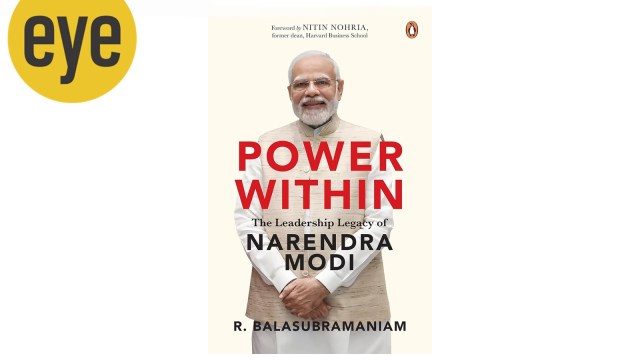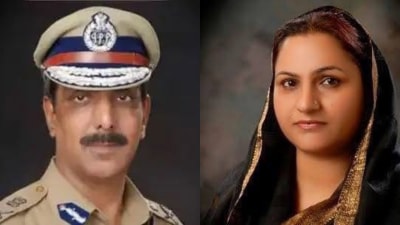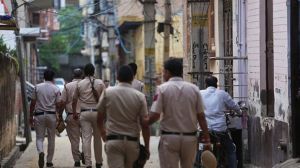Power Within examines why Narendra Modi’s leadership sets him apart
While illustrating PM Modi’s leadership qualities, Balasubramaniam offers a comprehensive survey of Indic and Western styles of leadership. From Chanakya’s Arthashastra to Shri Aurobindo’s leadership and Vivekanada’s seva bhav
 Balasubramaniam offers a comprehensive survey of Indic and Western styles of leadership. (Source: Amazon)
Balasubramaniam offers a comprehensive survey of Indic and Western styles of leadership. (Source: Amazon)A great leader brings about perceptible change in the lives of people. A visionary leader changes the course of history. Power Within: The Leadership Legacy of Narendra Modi by R Balasubramaniam spotlights some of these visionary aspects of PM Modi’s leadership along with introducing the reader to multiple leadership theories.
In 2014, over 1 billion people practised open defecation across the world. Of these, nearly 600 million were Indian. Inspired by Gandhi ji’s passion for cleanliness, successive governments had organised sanitation programmes since Independence. However, open defecation persisted in India. It was only by 2019 that India was declared open-defecation free. How was this transformation achieved?
In July 2014, the Ministry of Rural Development, amongst others, was asked to contribute possible points for PM’s Modi’s first Independence Day speech. As OSD to the then RDD Minister, we made drafts on many issues, including Nirmal Bharat. To our amazement, PM Modi chose to speak on the pain and indignity of our mothers and sisters who are forced to defecate in the open.The PM gave a clarion call to make India free from open defecation by 2019 to mark the 150th anniversary of Mahatma Gandhi. He ignited a mass movement for Swachh Bharat mission (SBM). MPs were asked to allocate MPLAD funds for toilets, particularly in schools. Corporates were requested to contribute to SBM as CSR.
In the decade that followed, more than 300 million women had personal toilets constructed under SBM. This is one of the most significant long-term impacts of large-scale elimination of open defecation in rural India. Balasubramaniam sketches how PM Modi’s personal experience of poverty, and empathy for fellow citizens, articulated as janbhagidari, “inspired change and ignited hope”.
I have been trekking in Kashmir since my college years. However, by 2007, cross-border terrorism gripped Kashmir. Walking and camping in Kashmir became out of bounds for most of us. In 2022, I started trekking in Kashmir again. I met dozens of Kashmiri trekkers on the way.
It required determination and what Balasubramaniam calls, “adaptive leadership” to overcome the challenge of militancy in Kashmir. Adaptive leadership requires evolving solutions which involve stakeholders as problem solvers. Article 370 was a temporary provision of the Constitution, but over time, it became perceived as a permanent feature. Balasubramaniam explains how the PM understood that technical solutions like increasing military presence to counter terrorism or financial provisions for subsidising Kashmir’s development were not sufficient as these had been tried in the past. Involving stakeholders, following deep consultations and strategic planning were the key to adaptive leadership. Article 370 was abrogated. By 2022-23, apart from me, 23 million Indians had visited Kashmir. Kashmir’s GDP grew at a scorching pace of 15 per cent per annum. The peace dividend enjoyed by ordinary Kashmiris was the greatest gift of the abrogation of Article 370. Kashmiris benefiting from growing prosperity are part of PM Modi’s janbhagidari and constitute a bulwark against terror.
When the earthquake struck Kutch in 1998, Gujarat experienced its worst disaster. I had already handled the Latur earthquake in 1993. Hence, I resigned from the office of then chief minister of Maharashtra, Vilasrao Deshmukh, and initiated a reconstruction programme in Bhuj under United Nations Development Programme. However, multiple international and national agencies acting in discord slowed down the rehabilitation. As soon as Modi took over as CM, a new dynamic team led by Pramod Kumar Mishra was put in place. Institutions like the Gujarat State Disaster Management Authority were strengthened. The earthquake-affected villages of Kutch were rehabilitated in an exemplary manner.
After this successful experience, PM Modi was ready to handle the biggest disaster of this millennia — Covid-19. Balasubramaniam describes how the PM presciently predicted the crisis in the first meeting with the cabinet secretary. Afterwards, his leadership helped India’s economic revival. Most critically, he extended social protection to the poor by making provisions for free food grain at scale via Garib Kalyan Yojana.
While illustrating PM Modi’s leadership qualities, Balasubramaniam offers a comprehensive survey of Indic and Western styles of leadership. From Chanakya’s Arthashastra to Shri Aurobindo’s leadership and Vivekanada’s seva bhav, from Boyatzis’s Intentional Change Theory to Mihaly Csikszentmihalyi’s state of flow to the Dalai Lama’s interest in the intersection of neuroscience and leadership, the book offers a peek into leadership theories and practices from around the world, making it a one-of-a-kind look at the life and practices of a remarkable leader.
Pardeshi is a former IAS officer



- 01
- 02
- 03
- 04
- 05




























